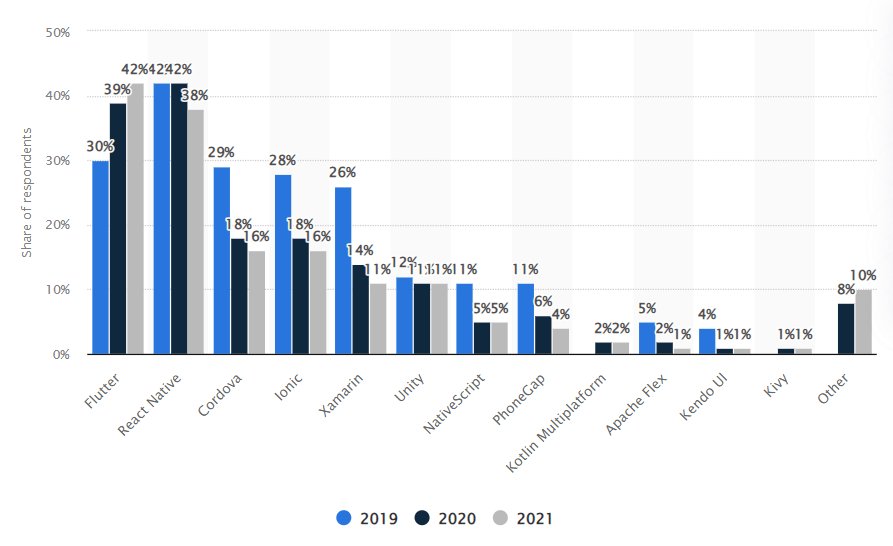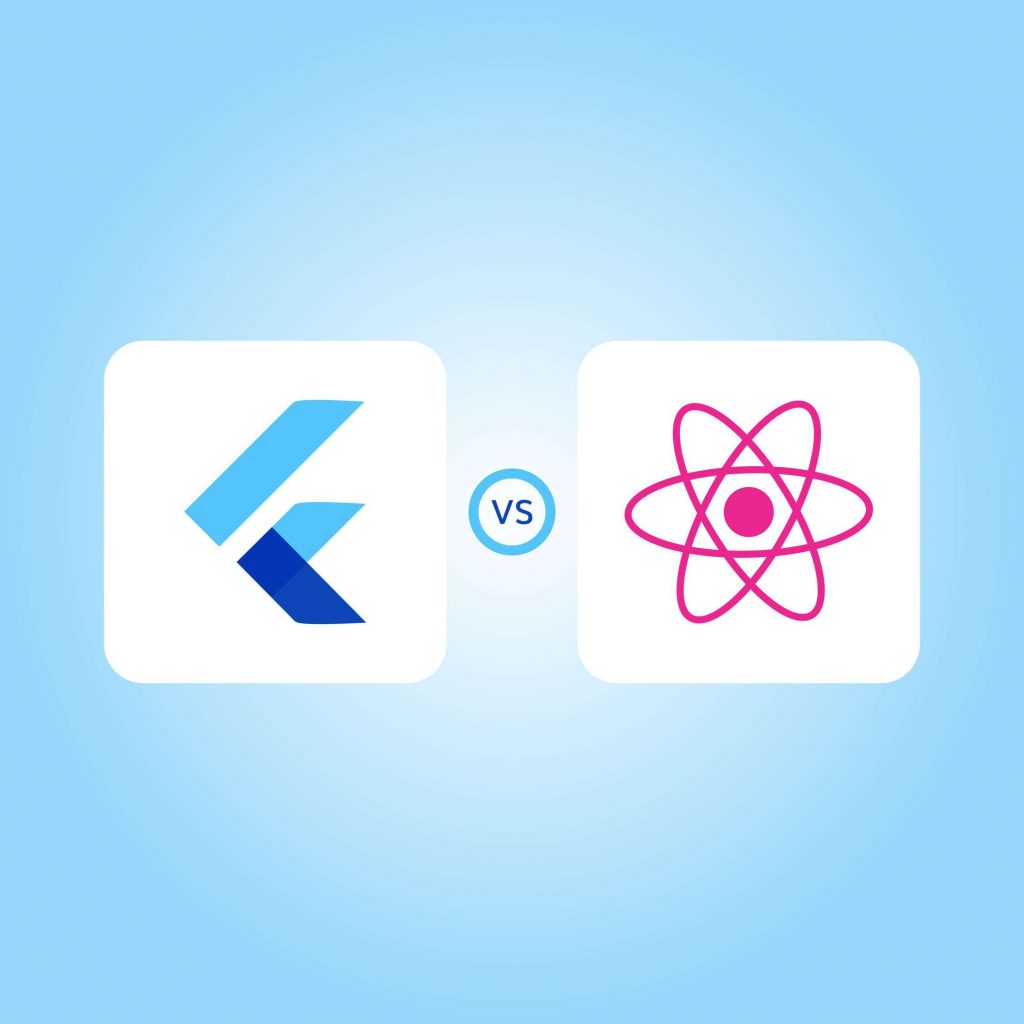How to Choose Best Cross Platform App Development Framework in 2022?
Our smartphone applications can literally do anything for us. Starting from identifying a song with Shazam to finding ourselves our loved ones with Tinder, apps are being designed so smart that our dependence on them keeps on growing with every passing day.
However, have you ever wondered about the fact that what if these applications were only able to run on Android devices and not on the iOS ones? Or, in more practical terms, what if these applications didn’t have cross-platform support in them?
So to solve this issue, cross platform app development framework kicks in. These days, even app developers use emulators of a typical kind to run and test the apps they are developing for a platform they do not own.
If there weren’t cross platform app developers for most of the daily applications we use, there would have been a serious concern over the war between iOS and Android platforms. According to statistics available, an Android user gets to choose between a selection of 2.56 million applications available on the PlayStore. Whereas on the other side, Apple’s App store has only a collection of selected 1.85 million iOS applications. Besides, going with numbers isn’t the prime concern here, as all the apps go through several quality checks before they are listed on their respective app stores.
Here in this blog post, we will discuss a few factors that will help you choose the best cross platform app development framework in 2022.
Introduction to Best Cross Platform App Development Frameworks 2022
So if you are someone who needs a heads up to get started with cross platform app development framework, then, fortunately, you have landed in the right place. But, if you are still not aware of the best cross platform mobile app development framework to work with, you should definitely read this blogpost.
This blog post is precisely for:
- A product owner who wants to get started with mobile app development and learn the things involved with it
- A professional developer using a single mobile app development framework and wants to make a switch to a cross platform framework
- A team member of an app development project who needs to understand the basics of a cross-platform app development framework and has to convey the same to the development team

How to Choose the Right Cross Platform Mobile Development Framework for 2022?
Talking about a few of the app-development frameworks already in use, we see the likes of Ionic, Xamarin, Native apps, React Native, and Flutter. However, the upcoming ones are very popular and mostly used for app development in recent times. But before that, one needs to understand the difference between Hybrid and Native apps and which one to choose to develop their specific applications.
Native Vs Hybrid Mobile Apps
The short and simple answer to this would be to go with Native apps over Hybrid added if it is possible in the first place
The Pros
Developing applications on native framework always provides greater independence and a better level of control. For instance, Facebook, who also happens to be the creator of React and React Native frameworks had to re-write the entire codes for their Messenger application once again only to achieve more power with a React native application.
Also, with React Native app developments, developers have the freedom to easily add new features that are complex nonetheless but improves the performance of the particular application. The developer’s community for React native is also on the mature side, with constant improvements shaping up every day.
The Cons
The biggest disadvantage with Native applications is that the skills and resources it requires to develop such kind of apps are always on the higher side. Hence, hiring a React app developer can come as a handy solution for the concerned issue.
However, a developer working with these kinds of applications must be fluent with several app development languages. Also, iOS app developers need to have a Mac in line to develop applications for that platform. Therefore, developers settle with building Android applications early in their careers.
Understanding the Difference
Before you even understand the difference between a Hybrid and Native application, you need to understand the requirements of your project first.
- If you are looking to develop an application that requires complex processing of data and is going to utilize the smartphone to its full potential, then going with a Native app would be your best-sought deal.
- If you have enough resources to invest in two different developers working for the two different platforms respectively, then also going with Native apps would be the best thing to do.
- If you can’t afford to develop an application for both platforms at the same time, then again, developing a Native app would be a great thing to do.
- If you want your application to be more data-driven, then going for a Hybrid app would be good.
So to sum up this query in short, if you have enough funds to invest in app development, there is nothing to choose from but Native. Native apps always have something more to offer, and that makes the investment worth every penny.
Flutter vs React Native: Which is Best for Your App in 2022
Here in this blog post, we will discuss the pros and cons of the two best Cross Platform App development frameworks that currently exist: Flutter and React Native.
Flutter
Flutter is an incredible cross platform app development framework that is from the house of the tech giants Google and is open-source at the same time.
Pros
- There is probably no other hybrid application development framework that can beat the performance of applications developed on Flutter. A high-performance application with Flutter is a guarantee.
- The hot-reload feature of Flutter allows a developer to instantly deploy changes made into an application’s code by running it almost instantaneously. Thus, this significantly increases developer productivity.
- Backward compatibility is another area where Flutter flourishes like a boss.
Cons
- There are fewer third-party packages available to support Flutter apps on multiple platforms.
- The freedom and flexibility to write codes on Flutter are less in comparison to that of React Native
React Native
React Native comes from the house of Facebook, and it is renowned for being the best cross-platform mobile application development framework in today’s times.
Pros
- It is a popular tech amongst all the app developers. So the strength of React Native’s community is extensively vast, to say the least.
- There are a good number of third party libraries, and packages support in React Native for developers to have a leading edge.
- There is no learning required for an experienced developer working with React Native.
Cons
- The dependency on third-party libraries is on the higher side.
- As React Native runs on JavaScript, it has poor performance in comparison to Flutter’s C and C++ architecture.
Popular Cross Platform App Development Frameworks
Xamarin
Xamarin is completely different from the above detailed discussed cross-platform app development frameworks. Xamarin is a streamlined framework widely adopted and used to develop apps for Android, Windows, and iOS leveraging C# and .Net, instead of HTML and JS libraries.
Node.js
Node.Js is a JavaScript runtime framework widely adopted by enterprise-grade product owners to develop cross platform applications. Node js cross platform apps are so much popular for developing highly responsive, efficient, and scalable networking applications.
Ionic
The product owners who need assistance with native-styled layouts prefer to use Ionic for their cross platform app development framework. Ionic offers extensive features and pre-defined elements and it has 120 native device features to create an app through Live Reload. If you are planning to build cross platform application that has advanced functionalities and customizable tools, then without a doubt, go for the Ionic framework.
Conclusion
After coming across the entire blog post, you would have realized that there lies no competition to apps developed on React Native. Developers will get complete control and have great flexibility at their disposal while developing apps on React Native. Whereas, Flutter is the contender in the competition, and is growing rapidly. Recently Flutter 3 has also been introduced. Hence, choosing the best framework according to your project’s requirements would be right.
If you are still unsure which ideal cross-platform app framework and looking for assistance with hybrid application development services, then get in touch with us. Based on your project requirements, our expert will choose an ideal cross-platform app framework. Get in touch with us today at info@technosip.com.
Contact Us
We’d Love to Help You
Get in Touch
- Fill out a request form. Please brief your requirements in-detail. The more we know about your amazing idea, the better we will guide and assist you with project time and resources
- We’ll reach out to you on priority to discuss next steps in the meantime please check out our case studies and insights.
- We look forward to collaborating with you to bring your idea to the market sooner than the traditional route.
Related




